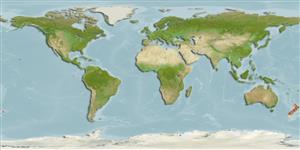Common names from other countries
Classification / Names / Names
Nomi Comuni | Sinonimi | Catalog of Fishes (gen., sp.) | ITIS | CoL | WoRMS
Environment: milieu / climate zone / depth range / distribution range
Ecologia
; salmastro; distribuzione batimetrica 0 - 100 m (Ref. 356). Subtropical, preferred 25°C (Ref. 107945)
Southwest Pacific: New Zealand.
Length at first maturity / Size / Peso / Age
Maturity: Lm ? range ? - ? cm Max length : 6.0 cm ShL maschio/sesso non determinato; (Ref. )
Life cycle and mating behavior
Maturità | Riproduzione | Deposizione | Uova | Fecundity | Larve
Members of the class Bivalvia are mostly gonochoric, some are protandric hermaphrodites. Life cycle: Embryos develop into free-swimming trocophore larvae, succeeded by the bivalve veliger, resembling a miniature clam.
SAUP Database. 2006. (Ref. 356)
IUCN Red List Status (Ref. 130435: Version 2024-1)
CITES status (Ref. 108899)
Not Evaluated
Not Evaluated
Human uses
Pesca: commerciale
FAO - Acquacoltura: production; pesca: landings | FishSource | Sea Around Us
Strumenti
Informazioni ulteriori
Age/Size
Accrescimento
Length-weight
Length-length
Morfologia
Larve
Abbondanza
Fonti Internet
Estimates based on models
Preferred temperature
(Ref.
115969): 8.7 - 17.1, mean 12.6 (based on 30 cells).
Vulnerability
Low vulnerability (10 of 100).
